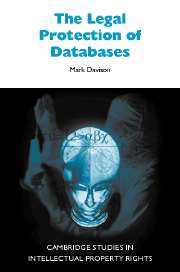Book contents
- Frontmatter
- Contents
- Foreword by William R. Cornish
- Acknowledgments
- Table of cases
- Table of legislation
- Table of European Union legislation
- Table of treaties, conventions, other international and regional instruments
- 1 Introduction
- 2 Some basic principles
- 3 Protection of databases in the EU
- 4 Transposition of the Directive
- 5 Protection of databases in the United States of America
- 6 International aspects of protection of databases
- 7 The appropriate model for the legal protection of databases
- Glossary
- Bibliography
- Index
4 - Transposition of the Directive
Published online by Cambridge University Press: 30 June 2009
- Frontmatter
- Contents
- Foreword by William R. Cornish
- Acknowledgments
- Table of cases
- Table of legislation
- Table of European Union legislation
- Table of treaties, conventions, other international and regional instruments
- 1 Introduction
- 2 Some basic principles
- 3 Protection of databases in the EU
- 4 Transposition of the Directive
- 5 Protection of databases in the United States of America
- 6 International aspects of protection of databases
- 7 The appropriate model for the legal protection of databases
- Glossary
- Bibliography
- Index
Summary
This chapter examines the transposition of the Directive into the domestic laws of the EU Member States. It does so by focusing on the protection of databases in nine of the Member States: Belgium, France, Germany, Ireland, Italy, the Netherlands, Spain, Sweden and the UK. The section below describes the legislation and case law of those countries relating to copyright and unfair competition as they relate to databases and the sui generis right. In order to avoid repetition, only particular features of the transposing legislation that are of note are discussed.
These nine countries were chosen for a number of reasons. First, they represent a broad range of pre- and post-Directive approaches to protection of databases. For example, Ireland and the UK had sweat of the brow copyright protection for databases prior to transposing the Directive. Most other countries did not have such copyright laws but had other schemes in place that conferred at least some protection on the non-original aspects of databases. For example, Sweden had its catalogue laws that influenced the Directive. Germany and other countries had, and still have, unfair competition laws that prevent parasitic copying by a competitor. Second, these nine countries represent the vast majority of the population of the EU and, finally, the vast majority of EU investment in databases and publishing occurs in those countries.
After examining the nine individual countries, the main issues raised by the transposing legislation and related case law are summarised. The chapter begins with three tables.
- Type
- Chapter
- Information
- The Legal Protection of Databases , pp. 103 - 159Publisher: Cambridge University PressPrint publication year: 2003



